Serendip is an independent site partnering with faculty at multiple colleges and universities around the world. Happy exploring!
Notes Towards Day One of "House of Wits": Reading Images, Imagining Forms

I. Reading an Image
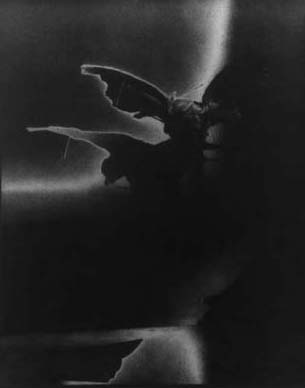
Reading Another:
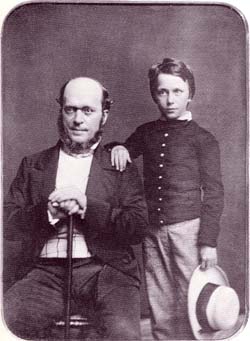
Who are you and what did you see?
In each picture?
Comparatively?
This course is conceptualized as an extended visit with one of America’s most interesting
and influential families: the unruly, expansive children of Henry James, Sr. --
and so we start today with the father.
The second image, taken by the famous photographer Matthew Brady,
shows him with his second son, Henry.
The first--which I take as the starting point both of the course and of the
lives of his three remarkable children, is one of Josephine Sacabo's photographs
of a dream state, "Obscene Bird of Night I" (I don't know about "II"...)
James, Sr. said in a letter to his two older sons, William and Henry,
Every man who has reached even his intellectual teens begins to suspect that life is no farce; that it is not genteel comedy even; that it flowers and fructifies on the contrary out of the profoundest tragic depths of the essential dearth in which its subject's roots are plunged. The natural inheritance of everyone who is capable of spiritual life is an unsubdued forest where the wolf howls and the obscene bird of night chatters.
Henry James Sr. lost a leg from an accident when we was a young man, and spent two largely solitary years in bed (years Emerson later credited with his individual habit of mind). In his early 30s, sitting by the fire after dinner, he suffered from a "vastation" that came upon him suddenly, without preparation; it presented itself to him visually, viscerally, as "some damned shape squatting invisible to me within the precincts of the room."
He came to follow the teachings of the 18th c. theologian Emanuel Swedenborg in understanding this experience as a necessary "emptying out," a stage in a redemptive spiritual process.
This experience, of horror giving way to light, was seminal in the lives of all his children....
...and has entered the cultural imaginary in other ways.
His passage about the "obscene bird of night," for example,
became not only the title of Sacabo's photograph,
but also the epigraph (and title) of a novel by a Chilean author,
a myth-like story with fabulous creatures and unlikely characters:
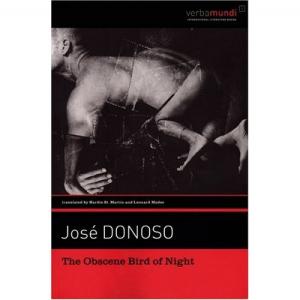 |
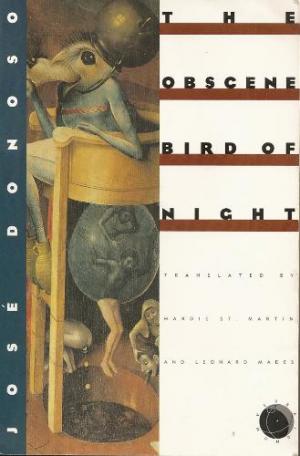 |
One of the most important things (I hope) we will be doing in this course is not only learning about what role the James family played in the late 19th and early 20th centuries, but also thinking about what role they continue to play in the 21st: in our culture and in our lives....
What difference does it make to our social and individual lives, that they lived?
I take the title of this course from a 2008 family biography by Paul Fisher,
![]()
which suggests several possible connections between "them" and "us":
For years, the Jameses lavished on one another a rich moveable feast of family life. Their father’s intellectual ambitions and shifting moods swept them capriciously from city to city, continent to continent…the family moved through Europe and America like vagabonds….Traveling continually with only the family for stability and continuity….They became the only real “country,” as William James later put it, to which any of them ever belonged….
Henry Senior passed on many of his obsessions to his children; with high expectations and elusive approval, he helped spur them all toward the anxieties of overachievement…their superhuman efforts to be seen, acknowledged, and understood dominated their private and professional lives, spawning grandiose plans, remarkable accomplishments, and deep, long-lasting depressions….
In their ambitions, ambiguities, and affectations, the Jameses can strike us as curiously contemporary—the forerunners of today’s Prozac-loving, depressed or bipolar,
self-conscious, narcissistic, fame-seeking, self-dramatized, hard-to-mate-or-marry Americans (3).
….As well-to-do middle-class forerunners, the Jameses belonged to a group trapped in between worlds…they inherited enough money to pursue the personal and professional lives they wanted…
the Jameses craved intellectual independence, and with that freedom came many difficulties;
they were all to free to consider their own happiness and satisfaction…
Just rich enough to worry about whether or not they were fulfilled, all the Jameses
tended to fall victim to introspection and self-scrutiny. Their richly textured private lives
forecast the increasing leisure and prosperity (but also the competition and dysfunction) of
coming generations. The Jameses were crucial pioneers of middle-class aspiration, anxiety, and self-realization (8).
![]()
Two very telling stories about dad:
On the one hand, he discouraged his older sons from going to college or settling on careers. As reported by Ruth Yeazell in her 1981 book, The Death and Letters of Alice James, "To commit oneself to some ‘earnest proposition in particular' is inevitably narrowing, and Henry Sr. feared above all lest his children be narrow; “what we were to do instead was just to be something, something unconnected with specific doing, something free and uncommitted, something finer in short, than being that, whatever it was, might consist of” (Henry James, Notes of a Son and Brother, 20).
On the other hand, when @ 29, "Alice told her father that she 'felt very strongly tempted' to kill herself--as he wrote to her brother Bob--he told her "she had my full permission to end her life whenever she pleased....only I hoped that if ever she felt like doing that sort of justice to her circumstances, she would do it in a perfectly gentle way in order not to distress her friends" (from Robert Richardson's 2006 biography of William James, p. 194).
___________________________________________________
Reactions to any of this?
Go 'round w/
your reasons for being here:
what is your knowledge of/
questions about the Jameses?
what interest in them
do you bring w/ you?
________________
Let me now introduce you to Henry Sr's (three most famous) children,
whose work represents, among other things, a wide spectrum of genres
(a diary, fiction, non-fictional essays):
how is that related to gender?
To birth order?
To the life tasks @ hand?
| We will begin the course w/ Alice, who spent her adult life in bed, suffering from the 19th- century female condition known as "hysteria." When Henry read her diary, two years after her death, he wrote to William that “the extraordinary intensity of her will and personality really would have made the equal, the reciprocal life of a ’well’ person—in the usual world—almost impossible to her—so that her disastrous, her tragic health was in a manner the only solution for her of the practical problem of life—as it suppressed the element of equality, reciprocity, etc” (from Jean Strouse's 1980 book, “A Voice of One’s Own.” Alice James: A Biography, p. 284). | |
|
We will turn next to her older brother Henry, who wrote 20 novels, 112 short stories (some as long as novels!), a dozen plays; biographies, autobiographies, critical and social essays (including a 1905 BMC commencement address), travel and museum impressions, innumberable literary notebooks and letters. His work moves from that of a realist to (what Cynthia Ozick calls in her 1993 essay, "What Henry James Knew") being as "one of the great avatars of modernism": "what was implicit in James became overt in Freud .... "The Turn of the Screw" and other Jamesian works ... afterward ... vibrate with cognitions that are ultimately not submissive to their creator. It is as if from that time forward, James was writing nothing but ghost stories ... teaching us about the presence of the unconscious ... the later James ... is overridden by a strangeness that is beyond his capacity to domesticate or explicate." |
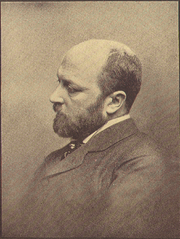 |
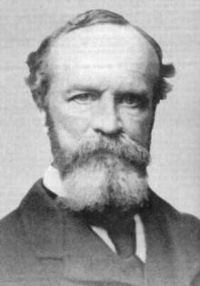 |
And we will conclude with the work of their oldest brother, William, whom (according to his biographer, Robert Richardson) there are 3 main reasons to remember :
|
- he was one of the great figures in the philosophical movement called pragmatism, which held that the truth of an idea is the sum of its actual results (he was interested in"the fruits, not the roots," of ideas), &
- he was the author of the founding text of the modern study of religion, The Varieties of Religious Experience ("King James"), which locates religious authority in individual religious experience.
WJ also had several particular connections with Bryn Mawr. His daughter Peggy went to school here; he gave a talk on "Psychology and Relaxation" here; and he wrote his infamous essay on "The Ph.D. Octopus" in response to M. Carey Thomas's refusal to appoint an English teacher until he had received his Harvard Ph.D. in philosophy.
The Ph.D. degree, James said, was "a mere advertising resource, a manner of throwing dust in the Public's eye," a grotesque tendency," "the Mandarin disease," "a sham, a bauble, a dodge where by to decorate the catalogues of schools and colleges"....He deplored the tendency of Harvard in particular to keep raising its standards for the degree as a means of carrying on a kind of specious warfare with other universities, he regretted the strength of this new form of academic snobbery that enticed undistinguished students into failure, and he feared for the consequences of the free spirit of the tendency toward excessive organization which he saw in the Ph.D.requirement (Frederick Rudolph, The American College and University: A History, p. 397)
We will read the Bryn Mawr-specific materials; we will also look @ a number
of contemporary reflections on and spin-offs from all three of the Jameses.
Our plan for the semester...
For Monday, read Sontag's play and begin your commonplace book
w/ some pregnant quotes (and commentary, if you'd like...)


